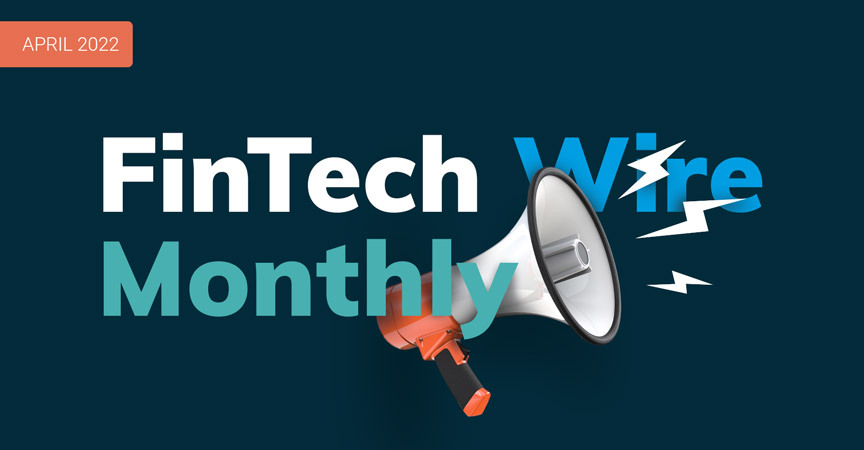Here’s your list of the most exciting news in the FinTech world. This time for April. This is a set of cherry-picked facts, so dive in to know more about the industry.

The UK is the 3rd global tech ecosystem
With an estimated value of $1 trillion U.S. dollars, United Kingdom’s tech sector is the third in the world. After American, and Chinese. This is a great achievement for the country, and a land of opportunity for entrepreneurs, and investors.
The UK has been making claims to the throne for quite some time now. The country’s inspiration for top positions in the tech and FinTech world is not exactly new. As we have previously reported, FinTech adoption has reached 86% in the UK alone. You can also read an article on the Kalifa report, about the state of the FinTech industry in 2021.
Now Tech HQ is reporting a massive achievement in reaching third place for tech. At the same time, FX Empire reports on the announcement that the UK aims to be a global hub for crypto tech.
With developments like these and good press, the UK is surely strengthening its position on a global stage. Even despite leaving European Union, the economic engine is well-oiled and ready to go.
IMF: FinTechs present a challenge for regulators and a threat to some banks
The International Monetary Fund (IMF) called out FinTechs saying that they are a challenge for regulators. In a Global Financial Stability Report, IMF says that the combination of fast growth and the increasing importance of FinTech financial services for the functioning of financial intermediation can come with system-wide risks.
The point is – institutions can’t deal with the fast pace of growth. Additionally, less developed banks might not be able to compete to the technology gap. This poses a risk to their sustainability.
The report says that neobanks present a risk, especially in their local environments. By bringing value to the customers, they effectively cut businesses for traditional banks. IMF also says that
Rapid scaling may be a source of value, but it may also carry higher operational risks. Rapid scaling is a key feature of neobanks, and of young firms, more generally, as future growth is their main source of value. Rapid growth may also translate into the buildup of operational risks. Furthermore, evidence points to higher and increasing fraud through digital channels
(UK Finance 2021), suggesting that neobank clients may be more vulnerable to fraud than traditional bank clients.
Is Apple working to cut off FinTech partners for its Apple Card?
There’s no secret that Apple users are locked inside the company’s ecosystem. Sometimes it’s even called “reservation”. The same goes for developers; they create the code for multiple Apple devices and services. The system is stable, and self-sufficient for a reason – Apple wants control over what it uses to deliver results. Now, the level of control seems to be going total.
With the introduction of Fitness+ back in December 2020, many business owners feared that their applications can fall prey to the giant’s own service. Especially when people are using Apple One service to pay for it. That would be even more convenient for them. The fitness industry noticed – Peloton is one of Apple’s victims. Now Apple wants to cut the FinTech industry to provide services for Apple Card.
Right now, Apple is cooperating with third-party companies to provide various services for the giant’s financial services map. Goldman Sachs and Core Card are supporting the Apple Card itself, Green Dot supports Apple Cash, and Citizens Banks back up the iPhone Upgrade program. This can change, at least a bit. As Bloomberg reported, Apple is working on a program called “Breakout”. The goal is to bring financial services in-house, effectively cutting off FinTech business partners.
According to the confidential informant (CI)… excuse me, according to a person who wants to be anonymous because plans are not public, Apple wants to create its own solutions. These will include payment processing, risk assessment for lending, fraud analysis, credit checks, and
Additional customer-facing functionalities like handling disagreements.
The focus of the story? These are plans for the upcoming years. Although Apple is supposedly targeting future solutions rather than replacing current ones, it’s not hard to figure out what’s at stake here. First, in-house processors, then in-house entertainment and fitness services, and finally in-house modems for mobile devices. Not Apple is aiming at financial services.
What will it mean for Apple customers, developers, and business partners? Time will tell.
See you next time!
This would be all for this month’s most interesting FinTech news, remember to subscribe to our social media (LinkedIn, Twitter, and Facebook) to stay updated every time we publish new, spicy content.